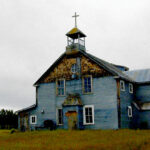By Jonathon Van Maren
This is Part II of my review of Rod Dreher’s The Benedict Option: A Strategy for Christians in a Post-Christian Nation. Part I can be found here.
One of the reasons I found Rod Dreher’s Benedict Option so fascinating is that the more I read, the more his proposal sounded precisely like the community I grew up in. Robust, self-sustaining subcultures operating outside of the secular mainstream? Check. A religious education facilitated by the church through weekly catechism lessons, Bible and church history lessons at school, and parents who provided (and insisted) that the Christian classics of times past were read at home? Check. A resistance to negative secular influences? Check. The Benedict Option, it seems to me, is already underway in some places in North America.
I grew up in rural Dutch Reformed communities, founded in Canada by immigrants from the Netherlands. Many of them arrived after the devastation of the Second World War, and still others after the North Sea Flood of 1953 when storm tides crashed through the dikes, causing widespread destruction and 1,836 deaths. Many of those immigrants—my grandparents included—arrived in Canada via Pier 21 in Halifax, where records show that between 1928 and 1971 the Dutch were the fifth largest ethnic group to arrive, seeking a new and better life. The bulk of them came to farm, and so agrarian communities sprung up, especially in Ontario, where 15,000 Dutch immigrants chose to settle.
The Dutch Reformed communities—I grew up in Chilliwack, British Columbia, and now live in Oxford County, Ontario—went to enormous lengths to set up their own Christian schools. Our grandparents, often with large families and little to no extra money at all, nevertheless made sacrifices to do whatever they could to assist financially in getting these schools off the ground, and then paid high rates of tuition to ensure those schools could hire staff, purchase the necessary resources, and continue to run. Real Christian education was of the utmost priority—and this began back when most public schools still opened the day with the Lord’s Prayer. Those who arrived in Canada and founded new communities recognized how essential it was to set up schools that would inoculate their children and grandchildren from secular influences that were growing fast.
Throughout The Benedict Option, Rod Dreher emphasizes again and again the power of secular influences—particularly television—to compete with parents and the broader religious community in passing on a set of moral values. Treat television strictly, he writes—and limit your children’s time with it. This, too, was very familiar to me. The Dutch Reformed communities went to great lengths to discourage television use, and for decades, were largely successful. I grew up without a television in the home, and was instead supplied with as many books as I could read and an active imagination for make-believe games outside. It wasn’t until recently, when I was doing the research for my book The Culture War, that I truly realized the role television had played in transforming our society and shifting its perceptions on family, sexuality, and Christianity. The entertainment industry was mobilized by secular progressives to push the rainbow blitzkrieg and cement the Sexual Revolution, and with enormous success.
Those who see television as harmless are underestimating its impact. The entertainment industry—especially comedy films and TV sitcoms—taught those who watched them that sin was funny. One night stands were funny, men preying on fatherless girls (with “daddy issues”) was funny, and mocking religion was funny. Today’s television, with its hundreds of channels, is now so saturated with sexual content even in the advertisements that saying a TV is necessary in the home for the unobjectionable content is rather like saying you only buy Playboy for the articles: It’s almost impossible not to expose yourself to the sexual content in the meantime. The thing is, our culture has become so pornified and inured to such things that hyper-sexual advertisements that would have shocked previous generations and classified as soft-core pornography a few decades ago now barely raise an eyebrow, even among Christians.
Communities that wish to survive with their values and traditions intact must be incredibly discerning in the sorts of entertainment they allow in the home—put another way, parents must be very careful as to which entertainers they permit to have access to their children. As I summarized in my previous column, Dreher notes that one of the reasons churches are losing the young in droves is because they have not been able to compete with secular influences which convey radically anti-Christian values, and in many cases have instead tried to imitate secular culture. Tradition is a dirty word for many people, symbolizing outdated, boring, or useless practices that have no place in the modern age. It is essential that parents convey the value of tradition to their children, and explain that while tradition is not Scripture, it is still incredibly important.
Growing up, I was often frustrated with the way things were done, as it seemed to me that the answer to my questions about such things was often that this was simply the way thing had always been done. Years later, I began to realize that there was something wonderful about doing things in the same way that my parents, grandparents, and great-grandparents—if not even further back—had done them. Of course, in every community there are always close-minded, genuinely outdated, or counter-productive cultural attitudes that need to be dispensed with. New challenges and new times call for culturally appropriate responses and a willingness to forge new paths if that is necessary. Reactions to secular influences cannot be instinctive, as they so often are, but must be well-thought out. But as G.K. Chesterton once put it, “Tradition is the democracy of the dead.” It is not simply the “way things have always been done”—sometimes, it is the culmination of the wisdom of generations past.
Dreher emphasizes that churches need to reach back into their own traditions and their own heritage and explore the richness that lies there. For the Reformed communities, this would be the heritage of the early Church, of the Reformation, of the English Puritans (some of whom left from exile in the Netherlands to settle in America), and of the Second Dutch Reformation (Nadere Reformatie). For powerful examples in our own traditions that illustrate how to reach out to the culture, we can look to men like the abolitionist reformer William Wilberforce, who after his conversion was planning to abandon politics but was advised against it by his friend and mentor, the Rev. John Newton. Our Christian heritage is filled with examples to follow, wisdom to apply, and warnings to heed. To plant our roots only in the shallow soil of the here and now is to ensure that we will blow over at the first gusts of the secular storm.
One of the major threats to the communities that I grew up in is that doctrinal training and tradition now must be augmented by a comprehensive education in Christian apologetics, especially for those heading off to college or university. When I arrived at university, I soon realized that I had no idea how to defend my worldview from the onslaught of skeptical secularists that made up the faculty. I could explain my doctrinal beliefs from the Bible, but had no answers to more foundational questions: Does God exist? Isn’t the Bible just a collection of manmade stories? Why is Christianity true and not other religions? Previous generations were simply not faced with these questions, and this left those like me woefully unprepared to defend the Christian worldview. This is not only true for Dutch Reformed communities, but Christian denominations of every stripe across the continent: Many young people leave after having their worldview challenged, and having no answers to offer in defence. Seeds of doubt planted in the first semester of university by professors or peers are carefully tended and nurtured throughout the educational experience, and by the time graduation comes around, the cumulative weight often crushes any remaining belief.
Dreher is careful to note that Christian subcultures must be extremely careful to ensure that a “cult-like community standard” is not created. He cites examples of young men and women who left their communities entirely, frustrated by the fact that their questions were not answered—and that in many cases, questions would be treated as rebellious rather than an opportunity to more fully explain the Christian worldview. If parents or church leaders seem unwilling to answer questions and react angrily to them, this will instantly plant more doubt in the minds of those asking the questions. After all, people who simultaneously claim to have the Truth but recoil in frustration or fear when questions are asked seem to indicate by their reaction that they may not be as confident in their worldview as they claim. Young people notice this, and it has a profoundly negative impact. If parents simply do not know the answers to questions because they have never been confronted with them before, there is now a wealth of material available in bookstores and online to assist with any interest in Christian apologetics.
And then there is the number one threat to all Christian communities, no matter how successful or effective they have previously been in limiting secular influences: Online pornography. Those who would like to pretend that the porn industry is not busily and messily destroying the upcoming generation are not simply putting their heads in the sand, they are engaging in criminal negligence that flies in the face of all available evidence and denies what we know about human nature. I speak regularly on the spread of pornography through our culture, and after every presentation at a Christian school—Dutch Reformed as well as every other denomination—I get messages from students who struggle with pornography, with their addiction often beginning as young as the sixth grade. Every time I speak at a church, I get messages from wives who are struggling with betrayal trauma after they discover their husband’s porn addiction or husbands who desperately want to quit. After speaking at an information evening hosted by my own church, I had anonymous letters with heartbreaking stories left on my doorstep.
The church I attend has taken the much-necessary step of asking that all homes equip their Internet with a filter, something I believe other churches should consider, as well. Considering the scale of the threat, this is not a heavy-handed measure but a tiny first step in fighting the porn plague that is laying waste to the minds of the younger generation. Pornography in every Christian community is wiping out culture, destroying any perception of healthy sexuality, poisoning future marriages, and perverting any conceptualization of real beauty. The sheer level of porn consumption should make every parent, teacher, and church leader shudder in fear: In 2016 alone, more than 524,641 years of pornography was watched online—and yes, you read that number right.
All of the hard work of Christian communities in preventing secular influences from poisoning the young and inculcating them with biblical knowledge may be for naught if we do not combat this threat, and fast. Rod Dreher puts it simply: “Fight pornography with everything you’ve got.” In an interview several weeks ago, Dreher told me that the work the educators in the classical school his children attend put in is destroyed when children come home, pick up a smartphone, and start watching porn. Smartphones are essentially giving children access to every form of depraved porn imaginable, and are now taking the place of parents as the primary sex educators in the lives of children. If children or teens hear a word they don’t understand, they simply Google it. And when they do, they have access to hardcore porn in less than three clicks. Parents must teach their children the Christian view of sexuality, because at this point in our culture the choice is very simple: If you don’t teach your children about sexuality, porn will.
Christian communities have traditionally not been very good at discussing sexuality. Many find the topic uncomfortable, and thus choose to just let their children “figure it out.” This has never been a good strategy, but in the porn age it is profoundly damaging. Porn teaches people an ugly, demonic view of sexuality. Christianity teaches a beautiful theology of sexuality. Intimacy was a gift God gave in the Garden, but the invading porn plague is spreading barren desert at a lightning speed as far as the eye can see. Gregg Forster put it well in First Things: “Pornography’s rise to power represents an eruption of evil in truly demonic proportions, as if hell itself were conducting a D-Day operation and had won a beachhead from which to stage a larger invasion.”
Finally, Christian communities must be careful that an inward focus does not detract from our duties as Christians to our neighbors. Striving to save the babies being violently destroyed through abortion by their tens of thousands every year, for example, is not a political endeavor, it is following the Scriptural command laid out in Proverbs 24:11-12. While we use our communities to prepare and arm our children for what they will face in society at large, we must also strive to rescue our pre-born neighbors and speak truth to a culture that has abandoned it, but desperately needs it. Engaging in the political sphere is also essential, as attacks on religious freedom and parental rights in education are direct threats to Christian communities—and if the secular progressives have their way, we will lose the right to raise our children with the Christian worldview. These attacks are already happening on every front across the continent, and will only increase in the coming years. Bluntly put, working in the political sphere and public square to push back against these attacks is no longer an option: it is a matter of self-preservation.
Dreher’s Benedict Option, if understood correctly, is the combination of a strong defence—creating communities in which children can be raised and nurtured in the Christian faith and armed for the attacks they will face in society at large—and a powerful offense, defending our rights to sustain these communities. The Benedict Option is not suggesting that Christians should abandon our duties in society, either—Dreher told me that Christians must work to do what Christians have always done in responding to a Culture of Death, or we simply fail to be Christian. Our communities are under enormous threat: from the online pornography pulsing from every technological device within, and from secular progressives without. Dreher has begun a valuable conversation that every Christian must become part of in the near future—because our very future depends on it.
___________________________________________
For anyone interested, my book on The Culture War, which analyzes the journey our culture has taken from the way it was to the way it is and examines the Sexual Revolution, hook-up culture, the rise of the porn plague, abortion, commodity culture, euthanasia, and the gay rights movement, is available for sale here.








